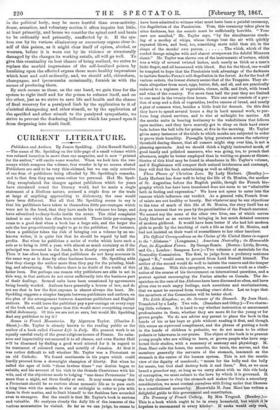CURRENT LITERATURE.
Publishers and Authors. By James Spedding. (John Russell Smith.) —The name of Mr. Spedding on the title-page of a small volume which was refused insertion in more than one magazine, and is now "printed for the author," will excite some wonder. When we look into the two essays which compose the volume, that wonder is by no means abated Publishers are said to be very thin-skinned, but we can only conceive of one firm of publishers being offended by Mr. Spedding's remarks, and to that firm they may seem rather too personal. Had Mr. Sped- ding recapitulated the charges against publishers which for years have circulated round the literary world, had he mado a single statement of a libellous nature, accused a single firm or the trade at large of anything approaching to dishonesty, the case would have been different. But all that Mr. Spedding seems to say is that his publishers have taken to themselves little per-centages which were not in the bond, that they have made his volumes too large, and have advertised cookery-books inside the cover. The chief complaint indeed is one which has often been uttered. These little per-centages come to a good deal when a book has a large sale, and the larger the sale the less proportionately ought to go to the publisher. For instance, when a publisher takes the risk of bringing out a volume by an un- known writer, it is quite fair that he should be repaid by half the profits. But when he publishes a series of works which have such a sale as to bring in 509/ a year, with almost as much certainty as if the principal was invested in the _funds, he is clearly overpaid with 250/. Then it has often been urged that publishers do not keep accounts in the same way as is done by other business houses. Mr. Spedding adds that they charge the author more than they pay for the printing, bind- ing, and advertising. We believe there is no doubt of the truth of this latter item. But perhaps one reason why publishers are able to act in this way, is that authors do not enter sufficiently into the business part of their dealings. Several suits have been occasioned by agreements being loosely worded. Authors have generally a horror of law, and do not see that in law the first expense is almost always the least. Mr. Spedding suggests a simpler bargain between publishers and authors, on the plan of the arrangement between American publishers and English authors. He would have the publisher pay a per-contage on every copy of the book sold, and he argues that this would meet everything except wilful dishonesty. Of this we are not so sure, but would Mr. Spedding find any publisher to try it ?






























 Previous page
Previous page